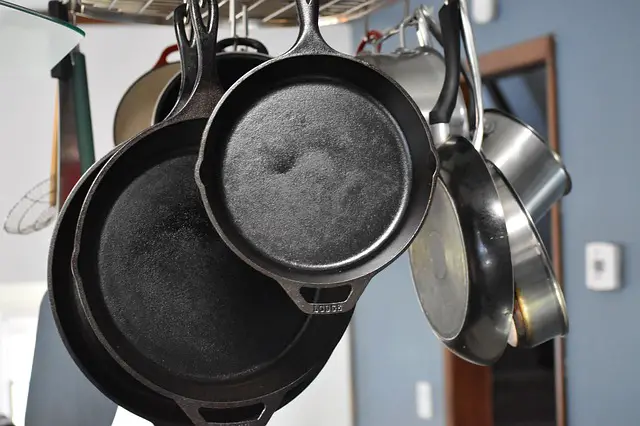Unlike what is propagated out there, cast iron is actually quite durable, and doesn’t require any special pampering to make it last longer.
That means that you don’t have to ditch the soaps when next you’re washing the pots under the sink, stir away from scraping rusts with scouring pads, or adopt a triple layer of protection in storage to prevent the perfectly seasoned surface from chipping off, it does take a lot more to make that happen.
That said, there’s still one area you mustn’t turn deaf ears to whenever cast iron maintenance is discussed. I’m sure you guessed that correctly, the double exclamation warning to NEVER put cast iron pans in the dishwasher.
Cast iron pans are not safe to put inside the dishwasher. It’s not like wrapping or shrinkage will occur, as cast irons are built tough as nails, but you risk destroying the seasoning that perhaps took many years to develop, as well as turn it into a rust prone article.
Cast iron pans are unable to fare well under dishwasher application because of the very nature of their constituent material: cast iron, as well as the mode of operation of cast iron pans.
In the next few headings, we’ll discuss how “cast iron material” itself prevent pans and pots from being dishwashed, how their mode of operation disagrees with machine cleaning, how to wash cast iron pans the proper way, how often to season them, and finally what other cookwares can and can’t be put inside the dishwasher to clean.
Why You Shouldn’t Put Regular Cast Iron Pans In the Dishwasher
There are two primary reasons why cast iron pans shouldn’t be put inside the dishwasher.
First is because washing them in the dishwasher gradually strips away their seasoning, making the pans turn really dry and dull eventually.
Seasoning is the thin layer of polymerized oil you build on the surface of your pans to make them rust-free and non-stick.
And no, the perfect seasoning isn’t built in one day like many of us believe, it’s a job that takes years of dedicated cooking and seasoning to achieve.
Now imagine losing all this effort in one go simply because you turned deaf ears to a basic warning!
If you don’t already know what losing your hard earned seasoning means, it’s a pronouncement that your pans would no longer have their non-stick properties and foods would cling onto their surface as glue clings to objects. It also means that your cooking wont be as perfect as it used to be!
What’s responsible for the complete wipe down of the polymerized oil is the automatic dishwasher detergent that dishwashers use.
These detergents consist of really harsh chemicals that are capable of reacting with the thin layer of seasoning, even though it’s chemically bonded onto the surface of the pan, under humid and high temperature conditions, to gradually break it down and wash it away.
With subsequent dishwashing, the seasoning continues to wash away more and more, until it disappears completely.
Automatic dishwasher detergents are this tough because of their very alkaline nature and also because they contain other tough ingredients like chlorine bleach.
The second reason why you shouldn’t put cast iron pans in the dishwasher has to do with rusting.
Because the pans are stripped of the seasoning that naturally protects againsts rusts in addition to its primary goal of providing non-stick properties, the pans become really prone to rusting outside the washer, unless they’re constantly re-seasoned every time they are put in the dishwasher.
Additionally, the long period of drying in the washer does more harm than good. It leaves more time for the cast iron to rust by providing the perfect ingredients: air, metal and moisture.
Dishwashers may not necessarily be the best medium to thoroughly dry cookwares too, and little moisture can still persist on your de-seasoned pans after drying which can lead to rusting during storage.
However, a rusted and partly de-seasoned pan caused by dishwashing isn’t really the end of the world, you can tackle these issues by following the steps below to give new life to your messed up pan.
First, we’re going to completely deseason the pan (because dishwashing must have already started the process for us: the little dark spots around your pan are the indications), then remove rust, and finally re-season.
How to completely de-season a cast iron pan
- With heavy duty rubber gloves on your hands and preferably eye protection, apply or spray all over the partly de-seasoned pan with a heavy duty cleaner containing lye, for example the easy off heavy duty foam cleaner.
- Seal the pan in a garbage bag and let sit for upto 24 hours.
Take the pan out and scrub it thoroughly with a heavy duty scrubber to completely remove the season. If there are still some seasoning left, (black spots), reapply the cleaner, let it sit for hours in the garbage bag, then scrub again. At the end of the day, the pan should have an even gun metal gray color— an indication that the pan is completely de-seasoned. - A much more effective way to remove seasoning is to use pure lye which you can get from any hardware store. Mix one pound bottle of pure lye to 5 gallons of water in a bucket, then soak the pan completely for 24 hours or more. Make sure to always add lye to water and not the water to lye to avoid violent reactions. Also, ensure to use heavy duty gloves and wear eye protection at all times while handling lye.
- Take out the pan and give it a thorough scrub with a scourer until all seasoning (black spots) are removed.
How to remove rust from cast iron pots after de-seasoning
To remove rusts, we’ll be using distilled white vinegar.
- Soak pans in as much vinegar required to completely submerge it and let sit for 14 hours. Be careful not to soak cast iron for longer durations in vinegar as it can pit and make a good and even layer of seasoning difficult to achieve.
- Remove and scrub vigorously with a scourer to remove rust.
How to re-season a cast iron pan after de-rusting.
- Immediately scrub the pan with warm soapy water and pat dry. Then put over high heat to completely drive off any remaining moisture otherwise rusting could begin almost immediately.
- Next, grease all over the pan with a thin layer of oil. Use a paper towel to apply, and then immediately degrease by patting dry with the same paper towel, make sure the pan doesn’t have any visible oil on it otherwise you risk not having a smooth even cooking surface.
- Now bake in a preheated oven at 450F for half an hour.
Repeat oiling and baking steps as many times as you wish to build a solid layer of seasoning on your pan. Remember, the more oil you bake on your cookware, the better and better it’s functionality gets.
And you’re almost there!
After all the steps above, the final instruction to follow is to never put a cast iron cookware ever in the dishwasher!
The Exception: Enameled Cast Iron
Vintage cast iron pots may not respond well to dishwashing, but their cousin, the enameled cast iron is definitely up for the task.
As enameled cast iron consists of cast iron sandwiched between layers of enamel coating, it doesn’t suffer from rusting like the regular cast iron does, and doesn’t require seasoning at all.
It’s only downside is that enamel, being somewhat inferior to the cast iron in terms of durability, can chip off, scratch, or shatter easily.
Because of the porcelain enamel coating, this version of cast iron pots and pans can safely go inside the dishwasher without suffering the downsides that traditional versions do.
It’s worth noting that the enamel finishing is still prone to dulling with continued washing, although it doesn’t affect the functionality in any way, and for skillet grills that develop patina which promotes perfect searing, that may be hindered too when using the dishwasher.
Washing enameled cast iron pots in the dishwasher is quite easy, place them on the bottom rack of the dishwasher and run a normal cycle plus dry cycle. If the pots have wooden handles, avoid putting them in the dishwasher completely.
How To Properly Clean Cast Iron Pans
Contrary to popular belief, cast iron pans need not be treated like little delicate flora. They are really sturdy and can withstand more than any mind can imagine.
Make sure to clean your cast iron pans by hand using a gentle soap, and to do that properly, follow the manufacturer’s instructions, or the instructions below.
- Clean cast iron pots in warm soapy water using a soft sponge. You can even get away with using scourers provided you don’t scrub too hard: yes, the patina is that strong! A gentler alternative to get rid of burn on bits is to use the synthetic scrubber at the back of your sponge. Another is salt. Pour a generous amount into the pan and set over high heat, scrub with a paper towel and wash with warm soapy water.
- Dry properly and put on the stovetop to evaporate any remaining moisture.
- Allow to cool, oil all over and pat until it looks dry, then set over high heat until lightly smoking (a couple of minutes).
- Store in a dry place, even stacked up one over another: yes, the seasoning is that strong!
If the pan is a new one, and doesn’t have seasoning already built up by the manufacturer, follow the procedure for seasoning outlined earlier.
When To Season Cast Iron Pans
Cast iron pans should be seasoned on the following occasions:
- After accidentally dishwashing them. In this case, you should de-season, de-rust: if there is any rust build up, then re-season using the procedures outlined earlier.
- After every washing, it is not necessary though if you cook regularly, especially with oil, as the cooking process solidifies the seasoning more with time which gets difficult to wear away.
Can You Put Other Pots And Pans In The Dishwasher?
As a general rule of thumb, pots and pans are safe to put inside the dishwasher even though manufacturers mainly recommend handwashing.
This means stainless steel, ceramic, enamel on steel and toughened non-stick pots and pans are all safe to put in the dishwasher.
What Else Can You Put In The Dishwasher?
Final Thoughts
Cast iron pans, despite being sturdy, can only tolerate handwashing and nothing else. You cannot put them in the dishwasher as the detergent plus humid and hot environment would make them rust, or more prone to rust, and it will also wash away the seasoning on them with continued practice.

